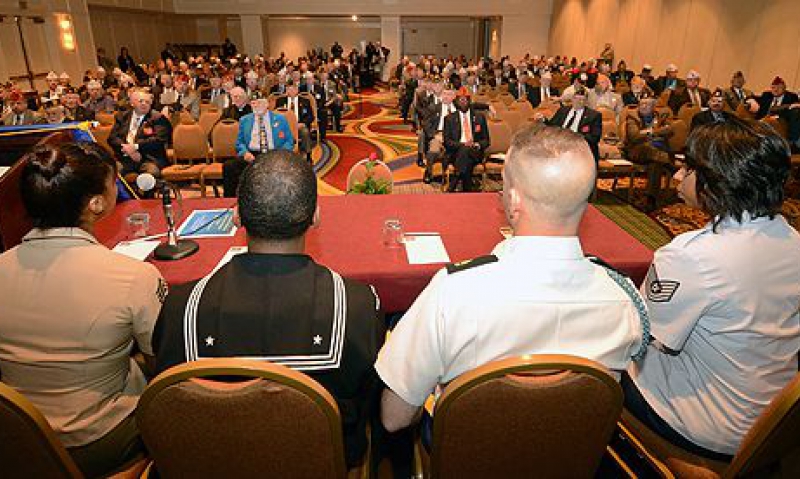
Four enlisted personnel provide a look inside the men and women of the armed forces during a panel discussion with the Legion's National Security and Foreign Relations commissions.
For a few members of the U.S. Armed Forces, repealing Don’t Ask, Don’t Tell isn’t issue – for now.
That opinion and others were shared with members of The American Legion’s National Security and Foreign Relations commissions in a March 21 panel discussion during the 51st annual Washington Conference. Enlisted personnel from the Army, Navy Air Force and Marines – who quotes weren’t attributed to allow them to speak with candor – gave a view inside today’s military and answered questions from Legionnaires.
The two-man, two-woman panel – comprised of an Air Force technical sergeant, a Marine Corps gunnery sergeant, an Army sergeant first class and a Navy hospital corpsman, all four having been deployed to Iraq or Afghanistan at one time or another – didn’t shy away from any questions, including one asking what the effect repealing DADT will have on U.S. servicemembers.
“They’re serving now,” a panelist responded. “Whether they decide to say ‘I’m gay,’ at that point, and I’ve been serving next to that soldier for the past five, 10, 15 years – it shouldn’t matter at that point.
“My only concern is with those who will attempt to enlist to make a political statement. My fear isn’t so much in them coming in because hopefully through basic training … they’ll realize we mean business when it comes to the U.S. military. My fear is the way the press will jump on top of it and run with it, especially if that soldier is discharged – which probably may be on their terms for being discharged – but the press will take it, and then it makes the military look bad.”
Another panelist questioned whether repealing DADT will even have an impact. “What is going to change once we implement Don’t Ask, Don’t Tell?” the panelist asked. “They’re already here. We understand that – not that we see them – but we know that they’re serving in the military.”
The panel was also questioned on the issue of women serving in combat. The consensus answer: It’s about time, especially in places like Afghanistan where culturally it’s easier for women servicemembers to interact with female residents of the area.
“It’s about time we seriously look at this opportunity,” a male panelist said. “Our capabilities … are only maximized by having female soldiers present, because we have a huge population we are interacting with in Iraq and Afghanistan (that) we as males cannot talk to, cannot in some cases even look at.”
Panelists also talked about the challenges facing them as career military personnel. Balancing family and a military career was one difficulty; one panelist also brought up the issue of day care.
“The money (for subsidized childcare) is there. The facilities are not,” the panelist said. “A six-month wait list for day care just is not going to cut when you’ve got 24 hours duty or when you’re looking to be able to move around and do things necessary to do your job. That is one huge thing.”
- Washington Conference

